“Did you have fun today?” the parent asks when the child comes home from the playground, or park, or a friend’s house, or the baby sitter’s, or shopping, or school, or wherever. It is the ubiquitous question put to children by adults who care about those children and want them to enjoy life.

But, let’s think for a moment. Fun is a noun meaning a source of enjoyment or amusement. It is a feeling of pleasure that is the result of something. It is not a verb that tells a child how to get that feeling.
Play is a verb. Fun is not. It is said that play is young children’s work. And it is. It is the large variety of activities young children do, and in the doing, learn hundreds of skills. Some of it is fun. Some of it is not. Play often results in feeling thwarted or disappointed or frustrated.
We all want our children to have fun, but we can’t make them have fun.
We can provide opportunities that we think will be fun, but the children will decide if they are or not. And if we force it, if we insist that children’s lives should be fun, fun, fun, we are apt to get dissatisfied, unhappy, cynical youngsters and adolescents who blame us because their lives are not fun. Fun is not bad, but it is an outcome of some activity, not the activity itself. So let us teach children how to do things and then wait to see if they have fun.
In the Overindulgence Research Studies, participants reported “My parents made sure I was entertained.” The “made sure” part of that became part of the over-scheduling that those adults who had been overindulged as children resented.
In a wish for children to have fun, parents provide children with entertainment. Entertainment is wonderful if we happen to like it. If we don’t, we live through it or we leave, but we don’t “have fun.” So, when did we adults switch to telling children how we want them to feel instead of what they need to do to grow successfully?
Consider the great grandmother’s directives about school:
- Be on time.
- Carry a clean handkerchief.
- Pay attention to the teacher.
- Learn your lessons.
All of these directives told the child what to do in order to be successful, to become competent in his time and place. Of course times have changed. Carrying a clean handkerchief is not necessary if the schoolroom has multiple boxes of tissues. So consider a modern mother, whose name I regret I do not know, who also tells her child how to be competent. As her child leaves for school this mom says:
- Be smart.
- Do something kind today.
The directive to be smart includes not only learning classroom lessons, but keeping yourself safe on the bus and handling yourself responsibly on the playground. Do something kind today signals the parent’s expectations about the child’s developing social skills. These two directives offer the child her parent’s assessment of how to be competent, or even how to survive in her time and place.
Have fun today
Now consider the parent who sends a child off with the message, “Have fun today!” That parent is telling the child how he is expected to feel, not what he is expected to do.
Children’s emotions are responses to their life experiences. Feelings give children important information about those experiences, information that helps children decide how to respond to those experiences:
- Scared – get to safety by yourself and/or with other’s help.
- Sad – get comfort within yourself or from others.
- Angry – find out how to solve the problem, by yourself and/or with help.
- Happy – enjoy within yourself and/or with others.
Children, even though they often resist, look to adults for direction. If we repeatedly say, have fun or did you have fun, what happens to scared, sad, and mad?
What to do instead
What can parents who want to know about their child’s experiences and emotions say instead of “Did you have fun?”
They can try saying some of the following:
- Tell me about…
- What did people do there?
- What did you do there?
- How did you do that?
- What feelings did you have when…?
- I want to hear about…
- Tell me one thing that happened.
- Tell me what was the first thing you did.
- What people were there?
- Did you play games (or do things) that you already knew how to do?
- Did you play any new games (or do new things)?
- Tell me about one thing you did for someone else.
- Tell me about something someone else did for you.
- Tell me about one thing you did well today and I’ll tell you one thing I did well.
- Tell me one thing you could have done better today and I’ll tell you one thing I can do better.
Some entertainment, some clown, some pony ride, some party, some theater, some sports events result in our having fun - but for children, probably the biggest fun is the fun they create.
Remember, having fun is an outcome of activities or actions. Fun is a result, not a process.
There is more help about avoiding overindulgence in How Much is Too Much? Raising Likeable, Responsible, Respectful Children – From Toddlers To Teens – In An Age of Overindulgence (2014, DaCapo Press Lifelong Books).
All photos from MorgueFile free photo.


